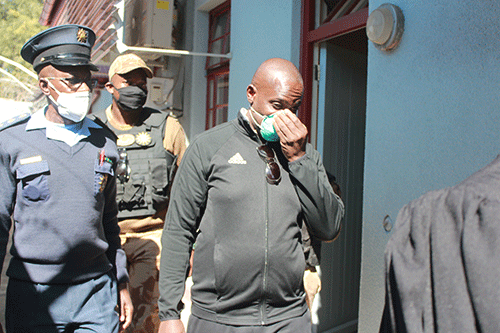A full bench of the Windhoek High Court yesterday dismissed a challenge by Fishrot accused James Hatuikulipi lodged against the provisions of the Prevention of Organised Crime Act (POCA) that were used by Prosecutor General Martha Imalwa in freezing his assets.
The provision challenged is the section that reads “or it appears to the court that there are reasonable grounds for believing that a confiscation order may be made against the defendant not violating Article 12(1)(d) and Article 16 of the Namibian Constitution.”
The Windhoek High Court issued a restraint order against Hatuikulipi in terms of Section 24 read with Section 25 of POCA and froze his assets. Hatuikulipi contended that the reasonable grounds test in the sections is unconstitutional because it violates his rights under Article 12, especially Article 12(1)(d) which is the right to be presumed innocent until found guilty in a court of law and Article 16 which is the right to possesses property.
According to Hatuikulipi, he has the right to his innocence and his right to his property until a court of law pronounces him guilty of the crimes he is alleged to have committed.
However, Judges Shafimana Ueitele, Collins Parker, and Herman Oosthuizen found that since restraint order proceedings are civil and not criminal in nature, the right to presumption of innocence does not apply to proceedings for a restraint order under POCA.
Judge Parker, who wrote the judgement with the concurrence of judges Ueitele and Oosthuizen, further found that a restraint order, being a reasonable interim order, aimed at preserving the realisable assets of the applicant pending the conclusion of his criminal trial, did not violate his rights under Article 16 in the Constitution.
Parker further said that the restraint order acts as a sort of guarantee in case an accused is convicted of the offences alleged against them and the State then determines the value of benefits arrived from the criminal activities.
It is only then, he said, that the State can apply for a confiscation order for the payment to the State of any amount it considers appropriate up to the value of the benefits he or she derived from the crimes.
Although, he said, it is called a confiscation order, it is in fact a civil judgement against the accused for the payment of an amount of money to the State.
The overall effect of Chapter 5 (of POCA) is to allow a court, which convicts an accused, to grant a civil judgement against him in favour of the State for the payment of an amount up to the value of the benefits he derived from the crime for which he has been convicted, and such other criminal activity which, the court finds, to be sufficiently related to it.
The judges collectively dismissed the application and made no order as to costs.
Hatuikulipi was represented by South African Senior Advocate Vas Soni on instructions of MKK and the prosecutor general by Wim Trengove SC also from South Africa assisted by advocates K Saller, Sakeus Akweenda and Mariette Boonzaaier, instructed by Government Attorney.
– rrouth@nepc.com.na
Caption: Dismissed… Fraud accused James Hatuikulipi.
Photo: File


